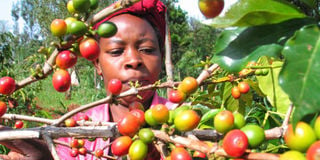The year began on a promising note but was disappointing

A farmer picks ripe coffee beans from her farm in Nyeri. PHOTO | FILE
What you need to know:
- Prolonged rains saw diseases strike crop when it was flowering, leading to poor harvests.
The year was a big disappointment to most coffee farmers across the country. But at the beginning of the year, there were signs of a good harvest when the long rains came early in March. This is when flowering starts, and given the way the crop had blossomed, growers anticipated a good year.
However, things changed when the rains continued longer than expected, such that, by July, the farmers hopes were shattered after diseases associated with extreme wet conditions struck.
For instance, the little-known Solai/Elgon die, was reported in Kiambu, Nyeri, Kisii, Murang’a and Nandi counties. Previously, the disease was mainly confined to Nakuru and the Mount Elgon area in Trans Nzoia County.
The more common coffee berry disease (CBD) was also reported. But unlike other years, most farmers in the Mount Kenya region complained about the agro-chemicals they use to control the spread of CBD. They lamented that the sprays were not effective.
Cooperative societies, which smallholder farmers use to market their coffee, have reported very low production, compared with other years.
At the Gatura Factory in Nyeri County, growers had delivered only 120,7227 kilos of coffee cherries by the third week of December, a the factory’s chairman, Mr Wanyaga Mutahi said, “In good season we usually register between 350,000 kilogrammes and 400,000 kilogrammes during such a period of the year,” he offered.
In some parts of the country, most farmers are staring at a crop failure.
Farmers were not sure whether the agrochemicals they use to stop the spread of the CBD was the problem. Some of the spray chemicals, they bought from different retailers worked, others did not.
So, the National Coffee Cooperative Union (NCC) — an umbrella organisation for smallholder farmers, sought an explanation from the national government.
There were suggestions that the agrochemicals should have been analysed by the Coffee Research Foundation (CRF) before being released to growers for use — as used to happen before.
But the CRF explained that it no longer gets government funding since Agriculture was devolved. And it is not the counties’ responsibility to establish whether or not an agrochemical is genuine. Besides, county governments lack the capacity to conduct such analyses.
This is an issue that was not addressed despite demands by the NCC.
Perhaps what would have brightened the farmers’ fortunes are the legal reforms developed by the Coffee Sub-Sector Implementation Committee (CSIC).
President Uhuru Kenyatta had set up the committee two years earlier to implement proposals made by a national task force he had appointed to turn around the coffee sub-sector.
First, the CSIC came up with the Coffee (General) Regulations 2016 draft, which was trashed by the officials of coffee cooperative unions. They were mainly opposed to the proposed mode of payment, whereby farmers would be paid directly through their individual accounts after their coffee is sold at the Nairobi Coffee Exchange (NCE).
After rejecting the rules in 2017, CSIC Chairman Joseph Kieyah brought in other stakeholders, apparently to find a way out.
He convened a high-level meeting of experts and governors from the 31 coffee-growing counties in January, and another with other stakeholders. He eventually came up with a revised draft, the Coffee (General) Regulations 2018, which, again, did not see the light of day. The draft is now before Parliament, awaiting debate and approval.
In the revised version, the role of a marketing agent at the NCE has been phased out. Only millers are required to grade coffee before taking it to the NCE.
It is believed that the marketers and millers worked behind the scenes to influence union officials to reject the new rules. And this is because the proposed regulations stipulated that every business transaction made by the miller at the auction must be made public.
But the committee’s term ended in October before Prof Kieyah and his team gazetted the new regulations. President Uhuru Kenyatta extended their term for the second time — for another one year. In addition, he appointed Susan Mochache, the Principal Secretary for State Department for Cooperatives, to co-chair the CSIC.
Other CSIC proposals like issuance of cheap fertilizer to farmers have been implemented. What the government is in the process of carry out is forensic audit of all the coffee cooperative unions in the country, which was also part of CSIC’s recommendation to resuscitate the ailing coffee industry.
The process has already kicked off but owing to lack of funds, the Department of Cooperative is currently conducting preliminary audit. It started with Nyeri, which was selected to pilot coffee reforms CSIC is implementing.
And the money from coffee proceeds has to be channelled directly to the grower – not through their Saccos as has been the norm.




